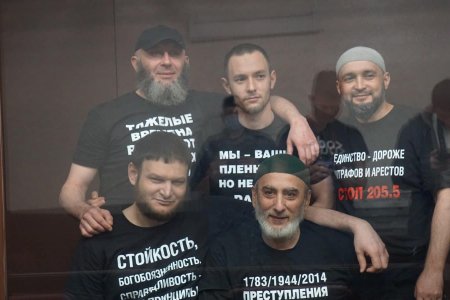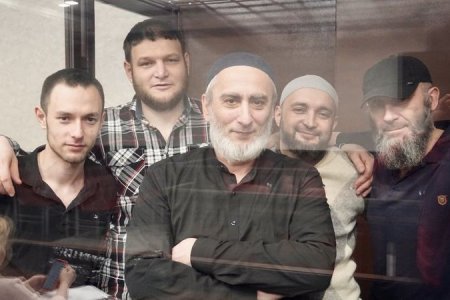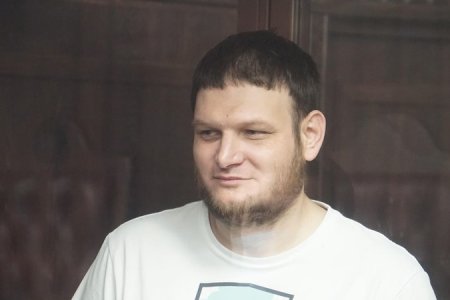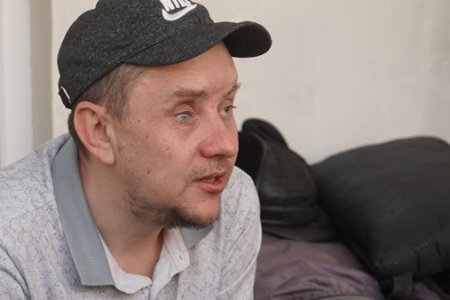
Russian officials have illegally prevented lawyers and the families of journalist Remzi Bekirov and four other Crimean Tatar political prisoners from travelling to Rostov in Russia for the verdict in the men’s ‘trial’. Huge sentences are expected, despite the fact that the men are not accused of any recognizable crime, and it is an act of gratuitous brutality that the men’s wives and other family members have been prevented from attending the hearing on 10 March.
Crimean Solidarity reported late on 9 March that several dozen Crimean Tatars had been stopped as they tried to drive on to the illegal Crimea bridge and prevented from travelling to Rostov-on-Don.
Remzi Bekirov’s wife, Khalide, explained that she and other wives, mothers, sons and other relatives had set out from Simferopol to Rostov, but had been stopped by road patrol police just before the bridge. They were prevented from travelling further, with the officers taking their passports and other documents, and eventually threatening to only give them back if they returned. Khalide notes that it was only Crimean Tatars who were stopped.
At around 1.30, the men’s relatives were forced to return, however the lawyers and journalists continued waiting.
Coming as it does amid Russia’s invasion and savage bombing of Ukraine, the hearing on 10 March is unlikely to receive the attention it deserves. It was almost certainly because of the international outrage over the arrests of 25 Crimean Tatar journalists and activists, mostly on 27 March 2019, that Russia moved to deflect such attention by splitting the ‘trial’ up into five identical clones.
Crimean Tatar journalist Remzi Bekirov; human rights defender Riza Izetov; and three civic activists Rayim Aivazov; Farkhod Bazarov and Shaban Umerov are facing the harshest sentences, but in all other respects, their ‘trial’ was the same as that of the other 20 men.
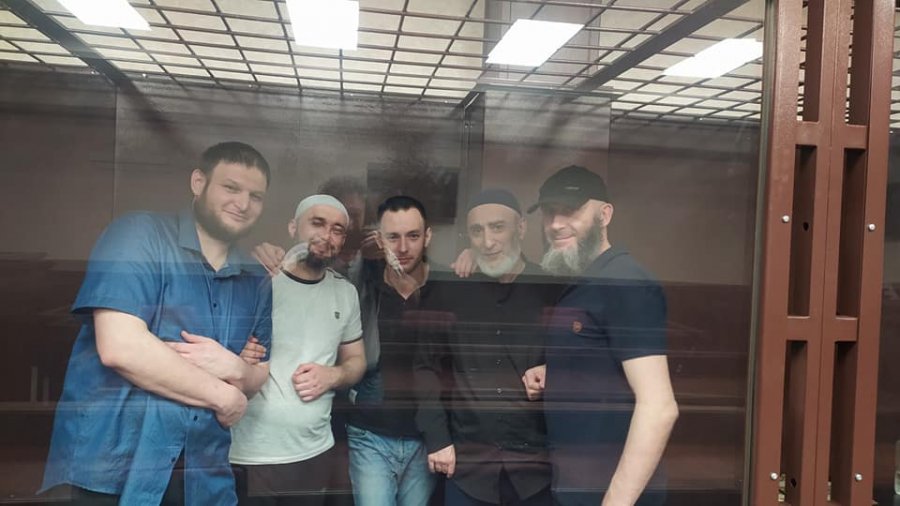
In January , Russian prosecutor Yevgeny Kolpikov demanded sentences from 16 to 18.5 years, despite the fact that not one of the men is accused of any actual crime or even of a plan to commit a real crime, merely of ‘involvement’ in a peaceful organization (the transnational Muslim Hizb ut-Tahrir party) which is legal in Ukraine and most other countries. In an extremely secretive and unexplained ruling from February 2003, Russia’s Supreme Court declared Hizb ut-Tahrir ‘terrorist’. It was not and is still not known to have committed acts of terrorism anywhere in the world, and Vitaly Ponomaryov from the Memorial Human Rights Centre has suggested that the decision was politically motivated. By calling Hizb ut-Tahrir ‘terrorist’, the Russian authorities could justify sending refugees back to Uzbekistan where they faced religious persecution and torture.
Since 2015, Russia has been breaching international law for another reason as well, namely by applying its legislation in occupied Crimea. Over 80 men, most of them Crimean Tatars, have been arrested on ‘Hizb ut-Tahrir’ charges, with the prosecutions increasingly used as a weapon against civic journalists and activists.
The five men in this case are facing the more serious charge of ‘organizing a Hizb ut-Tahrir group’ under Article 205.5 § 1 of Russia’s criminal code, the others with involvement in such an alleged group (Article 205.5 § 2). Unlike in many cases where it seems entirely arbitrary which charge a particular person faces, here there are very strong grounds for believing that Rayim Aivazov was reclassified as an ‘organizer’ after he refused to be silent about the torture he was subjected to following his arrest during the night from 16-17 April 2019.
In March 2020, all 25 men were also charged, under Article 278, with “planning a violent seizure of power and change in Russia’s constitutional order”. This charge has also become standard, although not one of the armed searches of the men’s homes found any weapons, and there is no evidence at all of any plans to commit violence.
‘Evidence’
Essentially none, but nor is evidence of a real crime even sought. The prosecution needs merely to ‘prove’ involvement in Hizb ut-Tahrir, with what is considered proof also being highly questionable.
The charges were based on illicitly taped conversations between the 25 men on religious, political and other, entirely innocuous, subjects back in 2016. Transcripts of the scarcely audible conversations were sent to FSB-loyal ‘experts’ who essentially provided the assessments demanded of them. During one of the hearings, the defence established that nobody has seen the original tapes of the conversations. The defence questioned two experts who carried out a phonoscopic examination and confirmed that there were signs of interference on the tape.
The primitive mistakes of the alleged religious ‘expert’, Mukhammed Zaripov, were exposed by an independent religious scholar (details here).
Russia was recently criticized in the UN Secretary General’s report on occupied Crimea for convictions based almost exclusively on anonymous testimony. The UN Secretary General pointed out, among other things, that the court frequently rejects, or limits, questioning aimed at demonstrating the discrepancies in these anonymous individuals’ claims and, generally, takes the side of the prosecution. All of this was seen in the present case.
There are absolutely no good grounds for keeping any ‘witnesses’’ identity secret and there is very strong evidence that men are being tortured, or threatened with imprisonment if they do not agree to ‘cooperate’ with the prosecution. Such collaboration almost certainly includes acting as ‘secret witnesses’.
The worth of such ‘testimony’ from secret witnesses was graphically exposed by a telling discrepancy in the initial account given by ‘secret witness Faritov’ and in court. Faritov was first ‘questioned’ before Aivazov’s arrest. He then gave ‘testimony’ that corresponded with the FSB’s version as of late March 2019, and did not mention Aivazov at all. It was after Aivazov formally retracted his supposed confession, that he was directly warned, with lawyer, Maria Eismont as witness, that he would “in that case” get the harsher of the two charges. This is exactly what happened in August 2020. During his interrogation in June 2021, ‘Faritov’ totally changed his testimony. In full accordance with the FSB’s adjusted indictment, he now claimed to remember that Aivazov, whom he had ‘forgotten’ in 2019, was one of the organizers.
All of this, as well as the efforts to conceal proof of Aivazov’s torture and much more, were invariably ignored by the three judges - Oleg Volkov (presiding); Vitaly Mamedov and Magomedbasir Shuyapov
The arrests on 27 March 2019 were condemned by Human Rights Watch who stated that “the sweeping arrests in Crimea aim to portray politically active Crimean Tatars as terrorists as a way to silence them”. All of the men were recognized almost immediately as political prisoners by the Memorial Human Rights Centre, and their release has been demanded by, among others, the European Parliament and US State Department.
